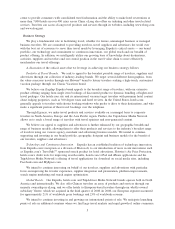Expedia 2008 Annual Report Download - page 21
Download and view the complete annual report
Please find page 21 of the 2008 Expedia annual report below. You can navigate through the pages in the report by either clicking on the pages listed below, or by using the keyword search tool below to find specific information within the annual report.on the withdrawal of non-U.S. investment and earnings; currency exchange restrictions; slower adoption of the
internet as an advertising, broadcast and commerce medium in those markets as compared to the United States
and difficulties in managing staffing and operations due to distance, time zones, language and cultural
differences.
Changing laws, rules and regulations and legal uncertainties may adversely affect our business or
financial performance.
Our business and financial performance could be adversely affected by unfavorable changes in or
interpretations of existing, or the promulgation of new laws, rules and regulations applicable to us and our
businesses, including those relating to the internet and online commerce, consumer protection and privacy.
Such unfavorable changes could decrease demand for products and services, increase costs and/or subject us to
additional liabilities. For example, there is, and will likely continue to be, an increasing number of laws and
regulations pertaining to the internet and online commerce, which may relate to liability for information
retrieved from or transmitted over the internet, user privacy, taxation and the quality of products and services.
Furthermore, the growth and development of online commerce may prompt calls for more stringent consumer
protection laws that may impose additional burdens on online businesses generally.
Adverse application of tax laws, rules or regulations could have an adverse effect on our businesses
and financial performance.
The application of various domestic and international sales, use, occupancy, value-added and other tax
laws, rules and regulations to our historical and new products and services is subject to interpretation by the
applicable taxing authorities. Many of the fundamental statutes and regulations that impose these taxes were
established before the growth of the internet and e-commerce. If the tax laws, rules and regulations were
amended, if new adverse laws, rules or regulations were adopted, or if current laws are interpreted adversely
to our interests, particularly with respect to occupancy or value-added taxes, the results could increase our tax
payments (prospectively or retrospectively) and/or subject us to penalties and decrease the demand for our
products and services if we pass on such costs to the consumer. As a result these changes could have an
adverse affect on our businesses or financial performance. In addition, we may be required in certain
jurisdictions to pay tax assessments, which may be substantial, prior to contesting the validity of such
assessments. This requirement is commonly referred to as “pay to play.” Payment of these amounts is not an
admission that the tax payer believes it is subject to such taxes. We continue to work with relevant tax
authorities and legislators to clarify our obligations under existing, new and emerging laws and regulations.
There have been, and will continue to be, substantial ongoing costs, which may include “pay to play”
payments, associated with complying with, and defending our position in, the various indirect tax requirements
in the numerous markets in which we conduct or will conduct business.
Provisions in certain credit card processing agreements could adversely affect our liquidity and
financial condition.
We have agreements with companies that process customer credit card transactions for the facilitation of
customer bookings of travel services from our travel suppliers. These agreements allow these processing
companies, under certain conditions, to hold an amount of our cash (referred to as a “holdback”) or require us
to post a letter of credit equal to a portion of bookings that have been processed by that company. These
processing companies may be entitled to a holdback upon the occurrence of specified events, including
material adverse changes in our financial condition, or for certain companies, at their discretion. An imposition
of a holdback by one or more of our processing companies could materially reduce our liquidity.
In addition, we may be held liable for accepting fraudulent credit cards on our websites for transactions
where we are merchant of record as well as other payment disputes with our customers. Additionally, we are
held liable for accepting fraudulent credit cards in certain retail transactions when we do not act as merchant
of record. Accordingly, we calculate and record an allowance for the resulting credit card charge backs. If we
are unable to combat the use of fraudulent credit cards on our websites, our results of operations and financial
condition could be materially adversely affected.
15
























